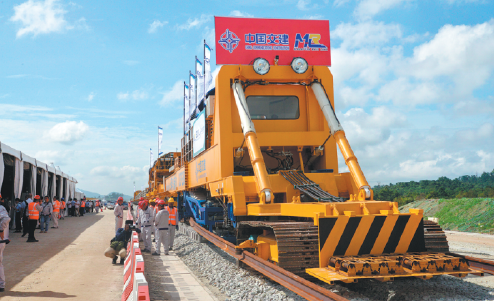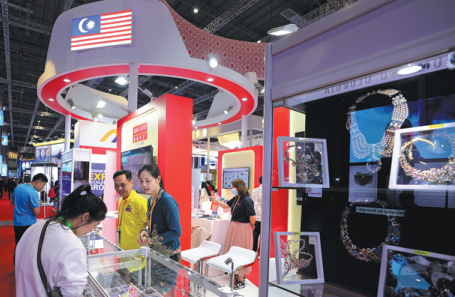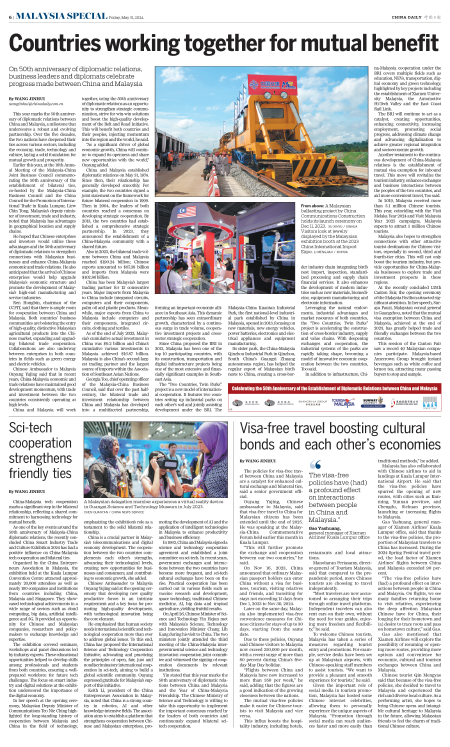
A Malaysian ballasting project by China Communications Construction holds its launch ceremony on Dec 11, 2023.

Visitors look at jewelry displayed by the Malaysian exhibition booth at the 2023 China International Import Expo.
This year marks the 50th anniversary of diplomatic relations between China and Malaysia, a milestone that underscores a robust and evolving partnership. Over the five decades, the two nations have deepened their ties across various sectors, including the economy, trade, technology and culture, laying a solid foundation for mutual growth and prosperity.
Earlier this year, at the 16th Annual Meeting of the Malaysia-China Joint Business Council commemorating the 50th anniversary of the establishment of bilateral ties, co-hosted by the Malaysia-China Business Council and the China Council for the Promotion of International Trade in Kuala Lumpur, Liew Chin Tong, Malaysia's deputy minister of investment, trade and industry, noted that Malaysia has advantages in geographical location and supply chains.
He hoped that Chinese enterprises and investors would utilize these advantages and the 50th anniversary of diplomatic relations to strengthen connections with Malaysian businesses and enhance China-Malaysia economic and trade relations. He also anticipated that the arrival of Chinese enterprises would help upgrade Malaysia's economic structure and promote the development of Malaysia's high-end manufacturing and service industries.
Ren Hongbin, chairman of the CCPIT, said that there is ample room for cooperation between China and Malaysia. Both countries' business communities are bolstering the entry of high-quality, distinctive Malaysian agricultural products into the Chinese market, expanding and upgrading bilateral trade cooperation. Collaborations are also underway between enterprises in both countries in fields such as green energy and electric vehicles.
Chinese Ambassador to Malaysia Ouyang Yujing said that in recent years, China-Malaysia economic and trade relations have maintained good development momentum, with trade and investment between the two countries consistently operating at high levels.
China and Malaysia will work together, using the 50th anniversary of diplomatic relations as an opportunity to strengthen strategic communication, strive for win-win solutions and boost the high-quality development of the Belt and Road Initiative. This will benefit both countries and their peoples, injecting momentum into the region and the world, he said.
"As a significant driver of global economic growth, China will continue to expand its openness and share new opportunities with the world," Ouyang added.
China and Malaysia established diplomatic relations on May 31, 1974. Since then, their relationship has generally developed smoothly. For example, the two countries signed a joint statement on the framework for future bilateral cooperation in 1999. Then in 2004, the leaders of both countries reached a consensus on developing strategic cooperation. By 2013, the two countries had established a comprehensive strategic partnership. In 2023, they announced the establishment of a China-Malaysia community with a shared future.
Also in 2023, the bilateral trade volume between China and Malaysia reached $190.24 billion; Chinese exports amounted to $87.38 billion and imports from Malaysia were $102.86 billion.
China has been Malaysia's largest trading partner for 15 consecutive years. Major imports from Malaysia to China include integrated circuits, computers and their components, palm oil and plastic products. Meanwhile, major exports from China to Malaysia include computers and their components, integrated circuits, clothing and textiles.
As of the end of July 2023, Malaysia's cumulative actual investment in China was $9.2 billion and China's cumulative various investments in Malaysia achieved $16.87 billion. Malaysia is also China's second-largest trading partner and the largest source of imports within the Association of Southeast Asian Nations.
Georgia Too, chief operating officer of the Malaysia-China Business Council, said that over the past half-century, the bilateral trade and investment relationship between China and Malaysia has developed into a multifaceted partnership, forming an important economic alliance in Southeast Asia. This dynamic partnership has seen extraordinary growth, characterized by a continuous surge in trade volume, cooperative investment projects and cross-sector strategic cooperation.
Since China proposed the BRI in 2013, Malaysia has been one of the top 10 participating countries, with its construction, transportation and digital infrastructure projects being one of the most extensive and financially significant examples in Southeast Asia.
The "Two Countries, Twin Parks" project is a new model of international cooperation. It features two countries setting up industrial parks on each other's soil and jointly assisting development under the BRI. The Malaysia-China Kuantan Industrial Park, the first national-level industrial park established by China in Malaysia, opened in 2013, focusing on new materials, new energy vehicles, power batteries, electronics and electrical appliances and equipment manufacturing.
Its sister park, the China-Malaysia Qinzhou Industrial Park in Qinzhou, South China's Guangxi Zhuang autonomous region, has helped the regular export of Malaysian bird's nests to China, creating a cross-border industry chain integrating bird's nest import, inspection, standardized processing and supply chain financial services. It also enhances the development of modern industries such as new materials, biomedicine, equipment manufacturing and electronic information.
Leveraging the natural endowments, industrial advantages and market resources of both countries, the "Two Countries, Twin Parks" project is accelerating the construction of cross-border industry, supply and value chains. With deepening exchanges and cooperation, the industrial systems of the parks are rapidly taking shape, becoming a model of innovative economic cooperation between the two countries, Too said.
In addition to infrastructure, China-Malaysia cooperation under the BRI covers multiple fields such as education, NEVs, transportation, digital economy and green technology, highlighted by key projects including the establishment of Xiamen University Malaysia, the Automotive Hi-Tech Valley and the East Coast Rail Link.
The BRI will continue to act as a catalyst, creating opportunities, enhancing connectivity, increasing employment, promoting social progress, addressing climate change and advancing digitalization to achieve greater regional integration and socioeconomic growth.
Another testament to the continuous development of China-Malaysia relations is the establishment of mutual visa exemption for inbound travel. This move will revitalize the tourism industry, enhance exchanges and business interactions between the peoples of the two countries, and aid more convenient travel, Too said.
In 2019, Malaysia received more than 3.1 million Chinese tourists. This year, coinciding with the Visit Melaka Year 2024 and Visit Malaysia Year 2025 campaigns, Malaysia expects to attract 5 million Chinese tourists.
Malaysia also hopes to strengthen connections with other attractive tourist destinations for Chinese visitors, especially in second, third and fourth-tier cities. This will not only boost the tourism industry, but provide opportunities for China-Malaysia businesses to explore trade and investment prospects in these regions.
At the recently concluded 135th Canton Fair, the opening ceremony of the Malaysia Pavilion attracted significant attention. In her speech, Suraya Pauzi, Malaysian consul general in Guangzhou, noted that the mutual visa exemption between China and Malaysia, achieved at the end of 2023, has greatly helped trade and friendly exchanges between the two countries.
This session of the Canton Fair saw a record 49 Malaysian companies participate. Malaysia-based Amecrown Group brought instant beverages such as white coffee and lemon tea, attracting many passing buyers to stop and sample.
wangjinhui@chinadaily.com.cn

